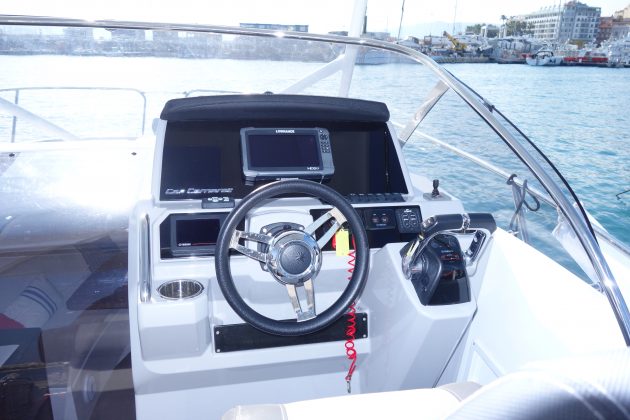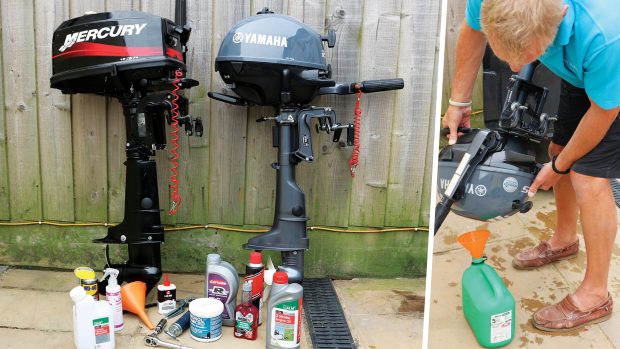The French yard’s latest offerings are both remarkably fast, capable craft. But which of the two is the better bet for your style of boating?
There’s a delicious guilty pleasure in jumping a boat so far out of the water that you get the props clear; that telltale fraction of
a second as the engine revs suddenly flair, causing your adrenalin gland to do the same.
It’s the same frisson of excitement, that same sense of lawlessness, that you get from briefly slipping the back end of a powerful rear-wheel drive car out of line on an empty wet roundabout – just for a moment, you’re Tom Cruise buzzing the tower in Top Gun.
But just like the car, it only really works if the boat is well balanced, if it feels born to do it – there’s little pleasure to be had opposite locking a camper van!
The mere fact that we’re trying so hard to get the props out of the water on our sea trial of Jeanneau’s new Cap Camarat 9.0 models speaks volumes – it wasn’t always like this with the French builder.

A decade or so ago, if you’d visited Jeanneau’s boat show stand in search of a sporty 9m sportscruiser, you’d have been politely directed to the group’s Leader line, either the Leader 8 or its earlier incarnation, the 805. Great boats, capable, comfortable
and spacious, they made excellent family cruisers, but no one ever attempted to get their props out, and with typically a single Volvo Penta diesel, they’d have been disappointed if they’d tried.
Today the market has changed, and so has the hardware.
Twin outboards, each as powerful as its predecessor’s single diesel yet weighing less in total, offer performance that’s simply in a different league.
Available in two distinctly separate model lines, one is an open walkaround boat, the other more of a large cuddy cabin,
but confusingly it’s the cabin version that’s called the WA and the walkaround boat that’s called the CC (it actually stands for Centre Console, apparently).

At the rear of the cockpit, the boats are identical, with a fixed transom bench and flip-out seats around the other sides of cockpit (you get the starboard one and one behind the helm seats for free but pay extra for an additional portside seat).
The cockpit table can be fixed in position on telescopic legs that allow it to convert to a lounger or demountable on removable legs. Opt for the latter, it takes up quite a bit of space.
The double helm is central, which gives rise to the ‘walkaround’ tag of the 9.0 WA, and access forward is easily achieved via steps on either side of the helm console leading to a totally flat foredeck which Jeanneau has utilised as a huge sunpad.
It’s a good use of this normally dead space, but it has an obvious trade-off in the cabin where headroom around the dinette is adequate, but only just. In fact, it’s a perfect metaphor for Jeanneau’s prioritisation of outside living.

The minimalist finish (if we’re being kind, basic if we’re not – there’s a lot of GRP moulding on show down here), the open-plan layout of the double berth beneath the cockpit and the lack of hanging lockers all collude to remind you that this is no cruiser.
Only the heads is anything more than the bare minimum, it’s actually quite generously proportioned. The specification level backs this up. You’ll be wanting to add the Comfort Pack if you require hot water, the single gas hob (positioned in the cockpit) or 240V shore support.
If you’re really not bothered about what’s inside, then maybe you should check out that 9.0 CC.
The aft section of cockpit is identical and the helm area is broadly similar, but rather than steps up to the flat foredeck, you stroll past the centre console at deck level to a bow area with a long, wide bench in the centre, backrest against the console. A further seat that curves around the inside of the bulwarks makes this a terrific social space – suddenly the whole boat is cockpit.

Clearly the trade-off for this is the cabin, but not as much as you might think. In fact, Jeanneau has cleverly utilised the
area beneath that large central seat to squeeze in a surprisingly useable double berth. Best of all, that generous heads is present and correct. There’s even a small section that runs back beneath the cockpit. You need to remove the steps to access it but it’s great for chucking bags and coats into, and Jeanneau is going to add a base cushion which will allow young children to sleep in there.
Finally, in recognition of the reality that the cabin is going to be a dumping ground for cockpit cushions at the end of a day on the water, you can lift the base of that forward seat and throw them straight in.
Ride out
But enough of the layouts, we’re here for the drive. You can opt for a single 350hp outboard, but the twin Yamaha 4.2-litre
V6 250hp outboards hanging off the transom of both test boats (one a WA, the other a CC) will do the Michaël Peters-designed hull far more justice.

Bald figures tell half the story – nail those throttles and you’ll have all three tonnes of boat (including those monster engines) planing in under five seconds. Keep them pinned and you’ll be at 40 knots just ten seconds later, the relentless upward flicker of the digital speed log only tailing off once you reach 45 knots (we briefly saw 47 knots out of the 9.0 CC).
These are properly fast boats. But they’re not super-focused scary fast, and it doesn’t take a badass raceboat pilot to get the best out of them – they absorb and then transmit that combined 500hp with consummate ease and friendly reassurance. And fun though it is, you don’t need to nail the throttles to get the Cap Cam 9.0 over the hump. Ease the power on gently and you’ll be planing effortlessly at 20 knots.
At 3,500rpm (a full 2,000rpm short of WOT), you’ll be cantering gently at 24 knots, or set the electronically synchronised throttles at 4,000rpm for about 30 knots (at which point the boat is only burning an extra 0.3 litres of petrol per mile).
Even flat out, whilst you and your crew will be glad of handholds like the stainless-steel rail that loops around the curved screen, you won’t feel the need to have a chiropractor on speed dial. Low-geared steering (it’s hydraulic, but not power assisted) means that hard fast turns are not wrist-flick quick but once you’ve wound it in, it grips every bit as tenaciously as it avoids cavitation.
Verdict
Having fully explored the handling and taken the performance figures, there’s only one thing left to do. The gently rolling
swell of a sunny Cannes afternoon provides all the temptation of an empty wet roundabout, and it’s time to buzz the tower. Pointing the nose out to sea, directly into the swell, we build speed gradually but relentlessly, the gaps between take off and landing steadily increasing but remaining utterly confidence inspiring as the hull soaks up our tomfoolery without complaint. Finally, with the needle touching 45 knots, we crest a big one. The Cap Camarat 9.0 CC leaps skyward and holds its trajectory just long enough to elicit the brief telltale tortured howl from the twin Yamahas, followed by a soft ‘whoomf’ from the hull as it transforms our landing into sheets of white spray that jet out low and fast. All four crew cheer – this is no camper van. 
For more information contact Jeanneau.
At a glance…
Build: GRP
RCD: B6/C10
LOA: 29ft 11in 9.12m
Beam: 9ft 9in 2.98m
Engines: Twin Yamaha
F250 250hp outboard
Fuel: 400 litres (88 gallons)
Water: 100 litres (44 gallons)
Price: from £97,227 incl. VAT
Price as tested £139,930 inc VAT

The new Brit Pack: Bladerunner 45
If the old Blade Runner 35 was good enough for David Beckham, the new Blade Runner 45 should be good

The new Brit Pack: Aston Martin AM37
The new Aston Martin AM37 is a truly bespoke, handcrafted work of art bearing one of the world’s most evocative

The new Brit Pack: Hunton 55
With an estimated speed 55-60 knots, sleek design and plenty of comfort and space, the Hunton 55 could compete with










